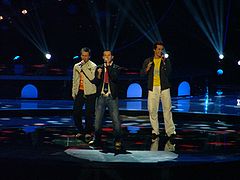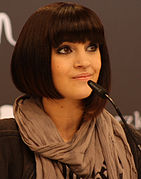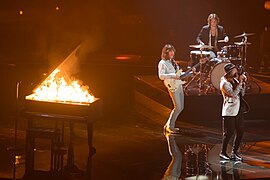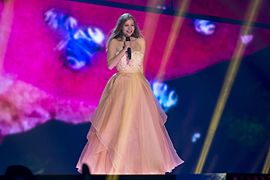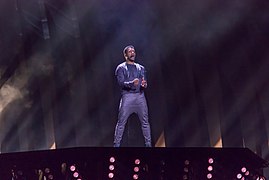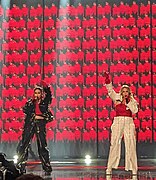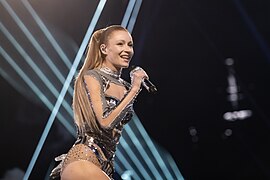Austria in the Eurovision Song Contest
From Wikipedia, the free encyclopedia
Austria has participated in the Eurovision Song Contest 56 times since its debut in 1957. The country has won twice, in 1966 and 2014, and such it holds the record for the longest gap between consecutive wins — 48 years. The Austrian participant broadcaster in the contest is Österreichischer Rundfunk (ORF). Vienna was the host city on both of the occasions that the contest was held in Austria, in 1967 and 2015.
| Austria in the Eurovision Song Contest | |
|---|---|

| |
| Participating broadcaster | Österreichischer Rundfunk (ORF) |
| Participation summary | |
| Appearances | 56 (49 finals) |
| First appearance | 1957 |
| Highest placement | 1st: 1966, 2014 |
| Host | 1967, 2015 |
| External links | |
| Austria's page at Eurovision.tv | |
Austria in the Eurovision Song Contest 2024 | |
Having finished sixth at the 1964 contest and fourth in 1965, Udo Jürgens won at his third attempt in 1966 with the song "Merci, Chérie". This was Austria's only top three result of the 20th century. Austria won again in 2014, with "Rise Like a Phoenix" by Conchita Wurst. Austria has finished last in the contest final seven times (1957, 1961, 1962, 1979, 1984, 1988, and 1991) and finished last in the semi-final in 2012. "Nobody but You" by Cesár Sampson achieved Austria's eighth top five result and second-best result of the 21st century at the 2018 contest, finishing third.
History
Summarize
Perspective
Österreichischer Rundfunk (ORF) is a full member of the European Broadcasting Union (EBU), thus eligible to participate in the Eurovision Song Contest representing Austria.
ORF finished last at its debut in the contest in 1957, before Liane Augustin gave the country the first of its eight top five results in 1958, with fifth. Having finished sixth in 1964 and fourth in 1965, Udo Jürgens won the contest at his third attempt in 1966. This would be Austria's only top three result of 20th century. The country's best result over the next 46 years (1967–2013) would be fifth place, which it achieved with The Milestones in 1972, Waterloo and Robinson in 1976 and Thomas Forstner in 1989. Austria has finished last in the final a total of seven times, in 1957, 1961, 1962, 1979, 1984, 1988, 1991. The country also finished last in the semi-final in 2012. Austria's best result of the 1990s was four tenth-place finishes, in 1990, 1992, 1996 and 1999. Austria's best result of the 2000s was Alf Poier's sixth-place in 2003, which was Austria's best placement since 1989.
After a three-year absence, ORF announced on 28 July 2010 that Austria would return to the contest in 2011,[1][2] where the country reached the final for the first time since 2004, finishing 18th.[citation needed]
Austria achieved its second victory in the contest at the 2014 contest, with Conchita Wurst winning with 290 points.[3] In a complete reversal of fortunes in 2015, following a tie-break rule Austria was placed 26th and scored nul points along with Germany (27th), they became the first countries since the United Kingdom in 2003 to score nul points at the final. Because of this, Austria became the first host country to receive nul points. Austria qualified for the final for the next three years, finishing 13th in 2016, 16th in 2017 and in 2018, when "Nobody but You" by Cesár Sampson finished third. The country's fortunes were once again reversed afterwards, with Paenda (2019), Vincent Bueno (2021) and Lumix feat. Pia Maria (2022) all failing to qualify. Teya and Salena returned Austria to the final in 2023, finishing 15th.
Absences
Summarize
Perspective
Austria has opted out of participation in several contests. The first of these was the 1969 contest, which was staged in Madrid. As Spain was ruled at that time by Francisco Franco, Austria chose to boycott the contest. Contest historian John Kennedy O'Connor points out, however, that Austria had given Spain two points in the previous event and since Spain only won by one point, the political protest was seen as disingenuous.[4]
The following year, Austria was again absent. This was due to the unprecedented result in 1969 in which four songs tied for first place, a result which prompted several other countries to opt out as well.[4]
From 1973 to 1975, Austria stayed away as well. The exact reason for this is unclear, however the scoring system in use at one of these contests, which allowed all entrants a guaranteed number of points, may have been a factor.
The country was ineligible to compete in 1998 and 2001, as it had not achieved sufficiently high placings in the five previous years.[4]
Prior to the 2006 contest, Austria announced that it would not enter a performer in protest at their poor results in previous years, arguing that the musical talent of the performers was no longer the determining factor in success at the event.[5][6] The country returned for the 2007 contest in Helsinki, but came second to last in the semi-final. National broadcaster ORF cited the 2007 result, as well as declining interest in the contest among Austrian viewers, as the reason Austria would not return to the contest in 2008. ORF programme director Wolfgang Lorenz also hinted that Austria may withdraw from the contest indefinitely, stating "ORF has no desire to send more talent out of Austria to a competition where they have no chances...Should the situation change, we'll be happy to take part again".[7] Despite withdrawing, the final of the 2008 contest was shown on ORF.[8]
In 2008, the EBU introduced two semi-finals to the contest, hoping that spreading countries out by random draw would prevent the kind of bloc voting that had warded Austria off. Additionally, juries were reintroduced to determine 50% of each country's result in 2009 (albeit not in the semi-finals, in which all but one of the qualifiers were decided entirely by televote). However, Edgar Böhm, director of entertainment for ORF, said that the semi-final format "still incorporates a mix of countries who will be politically favoured in the voting process" and "that, unless a clear guideline as to how the semifinals are organised is made by the EBU, Austria will not be taking part in Moscow 2009".[9] ORF decided not to participate in the 2009 contest, but did broadcast the final as in 2008.[10] The EBU announced that they would work harder to bring Austria back to the contest in 2010, along with former participants Monaco and Italy.[11] It was, however, confirmed that Austria would not participate in the 2010 contest in Oslo.[12] In July 2010, the chairman of ORF, Alexander Wrabetz, stated that Austria would return for the 2011 contest, due to it being held in its neighbour Germany.[1][2][13] In 2011, Austria reached the final for the first time since 2004.
Participation overview
| 1 | First place |
| 2 | Second place |
| 3 | Third place |
| ◁ | Last place |
| X | Entry selected but did not compete |
| † | Upcoming event |
Hostings
| Year | Location | Venue | Presenter | Photo |
|---|---|---|---|---|
| 1967 | Vienna | Großer Festsaal der Wiener Hofburg | Erica Vaal | |
| 2015 | Wiener Stadthalle | Mirjam Weichselbraun, Alice Tumler, Arabella Kiesbauer and Conchita Wurst | 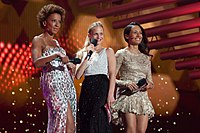 |
Awards
Marcel Bezençon Awards
| Year | Category | Song | Performer(s) | Composer(s) | Host city | Ref. |
|---|---|---|---|---|---|---|
| 2014 | Press Award | "Rise Like a Phoenix" | Conchita Wurst | Charley Mason, Joey Patulka, Ali Zuckowski, Julian Maas |
Related involvement
Summarize
Perspective
Conductors
| Year | Conductor[g] | Musical Director | Notes | Ref. |
|---|---|---|---|---|
| 1957 | Carl de Groof | N/A | [16] | |
| 1958 | Willy Fantel | |||
| 1959 | [h] | |||
| 1960 | Robert Stolz | |||
| 1961 | [i] | |||
| 1962 | Bruno Uher | |||
| 1963 | Erwin Halletz | |||
| 1964 | Johannes Fehring | |||
| 1965 | [j] | |||
| 1966 | Hans Hammerschmid | |||
| 1967 | Johannes Fehring | |||
| 1968 | Robert Opratko | N/A | ||
| 1971 | [17] | |||
| 1972 | Erich Kleinschuster | |||
| 1976 | ||||
| 1977 | Christian Kolonovits | |||
| 1978 | Richard Oesterreicher | |||
| 1979 | ||||
| 1980 | [18] | |||
| 1981 | ||||
| 1982 | ||||
| 1983 | ||||
| 1984 | ||||
| 1985 | ||||
| 1986 | ||||
| 1987 | ||||
| 1988 | Harald Neuwirth | |||
| 1989 | No conductor | |||
| 1990 | Richard Oesterreicher | |||
| 1991 | ||||
| 1992 | Leon Ives | |||
| 1993 | Christian Kolonovits | |||
| 1994 | ||||
| 1995 | Michael F. Kienzl | |||
| 1996 | Mischa W. Krausz | |||
| 1997 | No conductor | |||
Heads of delegation
Commentators and spokespersons
Between the 1970 and 1998 contests, every contest was commentated by Austrian radio journalist and actor Ernst Grissemann, with the exception of the 1979 and 1990 contests. Grissemann admitted to future German commentator Peter Urban in 1995 that he only stayed for the dress rehearsal and then provided the Austrian commentary live from the ORF studios.[21] After 1998 Grissemann stepped down from the commentary and was replaced by Andi Knoll. Austria has also broadcast the contests which it did not compete in, except for the 2010 contest.
| Year | Television | Radio | Spokesperson | Ref. | ||
|---|---|---|---|---|---|---|
| Channel | Commentator(s) | Channel | Commentator(s) | |||
| 1956 | ORF | Unknown | No radio broadcast | Did not participate | [22] | |
| 1957 | Unknown | [23] | ||||
| 1958 | ||||||
| 1959 | [24] | |||||
| 1960 | [25] | |||||
| 1961 | [26] | |||||
| 1962 | [27] | |||||
| 1963 | Hanns Joachim Friedrichs | [28][29] | ||||
| 1964 | Unknown | [30] | ||||
| 1965 | [31] | |||||
| 1966 | Hans-Joachim Rauschenbach | [32][33] | ||||
| 1967 | FS1 | Emil Kollpacher | [34][35] | |||
| 1968 | Unknown | [36] | ||||
| 1969 | Did not participate | [37] | ||||
| 1970 | Ernst Grissemann | [38][39] | ||||
| 1971 | No spokesperson | [39][40] | ||||
| 1972 | FS2 | [39][41] | ||||
| 1973 | Did not participate | [39][42] | ||||
| 1974 | [39][43] | |||||
| 1975 | [39][44] | |||||
| 1976 | Unknown | [39][45] | ||||
| 1977 | FS1 | [39][46] | ||||
| 1978 | FS2 | [39][47] | ||||
| 1979 | FS1 | [39][48] | ||||
| 1980 | FS2 | [39][49] | ||||
| 1981 | [39][50] | |||||
| 1982 | [39][51] | |||||
| 1983 | [39][52] | |||||
| 1984 | [39][53] | |||||
| 1985 | FS1 | [39][54] | ||||
| 1986 | [39][55] | |||||
| 1987 | [39][56] | |||||
| 1988 | [39][57] | |||||
| 1989 | [58][59] | |||||
| 1990 | Barbara Stöckl | [60][61] | ||||
| 1991 | Unknown | [62] | ||||
| 1992 | Ernst Grissemann | [39][63] | ||||
| 1993 | ORF 1 | [39][64] | ||||
| 1994 | Tilia Herold | [39][65][66] | ||||
| 1995 | FM4 | Stermann & Grissemann | [39][67][68][69] | |||
| 1996 | Martina Rupp | [39][68][70][71] | ||||
| 1997 | Adriana Zartl | [39][68][72][73] | ||||
| 1998 | Did not participate | [68][74] | ||||
| 1999 | Andi Knoll | Dodo Roscic | [68][75][76][77] | |||
| 2000 | [68][76][78][79] | |||||
| 2001 | Did not participate | [68][76][80] | ||||
| 2002 | Dodo Roscic | [68][76][81] | ||||
| 2003 | No radio broadcast | [76][82] | ||||
| 2004 | [83][84][85] | |||||
| 2005 | [86][87][88] | |||||
| 2006 | ORF 1 (Final) | Did not participate | [76][89] | |||
| 2007 | ORF 1 | Eva Pölzl | [90][91][92] | |||
| 2008 | ORF 1 (Final) | Did not participate | [76][93] | |||
| 2009 | ORF 1 | Benny Hörtnagl | [94][95][96][97] | |||
| 2010 | No broadcast | |||||
| 2011 | ORF eins | Andi Knoll | Hitradio Ö3 | Martin Blumenau (All shows) Benny Hörtnagl (Final) |
Kati Bellowitsch | [98][99] |
| 2012 | Andi Knoll (All shows) Stermann and Grissemann and Lukas Plöchl (Final) |
No radio broadcast | [68][100][101][102] | |||
| 2013 | Andi Knoll | [103][104] | ||||
| 2014 | [105][106] | |||||
| 2015 | [107] | |||||
| 2016 | [108][109] | |||||
| 2017 | Kristina Inhof | [110][111] | ||||
| 2018 | Kati Bellowitsch | [112][113] | ||||
| 2019 | Philipp Hansa | [114][115] | ||||
| 2020 | Not announced before cancellation | [116] | ||||
| 2021 | ORF 1 | Andi Knoll | No radio broadcast | Philipp Hansa | [117][118] | |
| 2022 | FM4 (Final) | Kurdwin Ayub, Florian Alexander, Hannes Duscher and Roland Gratzer | [119][120][121][122][123] | |||
| 2023 | Jan Böhmermann and Olli Schulz | [124][125][126][127][128][129] | ||||
| 2024 | [130][131][132][133][134] | |||||
Photo gallery
See also
- Austria in Eurovision Choir – A competition organised by the EBU for non-professional choirs.
- Austria in the Eurovision Dance Contest – Dance version of the Eurovision Song Contest.
- Austria in the Eurovision Young Dancers – A competition organised by the EBU for younger dancers aged between 16 and 21.
- Austria in the Eurovision Young Musicians – A competition organised by the EBU for musicians aged 18 years and younger.
Notes and references
External links
Wikiwand - on
Seamless Wikipedia browsing. On steroids.




